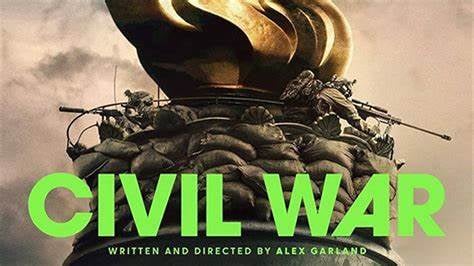Broadway Cinema has shown a variety of films over the last few months, including ‘The Iron Claw’, ‘Kung Fu Panda 4’ and the Amy Winehouse biopic ‘Back to Black’.
One of its most recent offerings was Alex Garland’s ‘Civil War’ - an ambitious and intense film that sometimes left me a bit lost because of its creative choices.
Set in what appears to be modern day America, the movie quickly establishes that the country is in the midst of a civil war.
The terror that Garland incites is seen from early on, as a group of photo journalists attempt to take pictures of a developing riot between citizens looking for water and police who are carrying riot shields and batons.
The journalists, who include the experienced actress Kirsten Dunst and up-and-coming star Cailee Spaeny, state that their intention is to travel to the White House in Washington D.C and interview the president. This sets the scene for the entire film, as the four journalists experience the atrocities of war and the very worst of humanity through their camera lenses.
My main gripe with the film was Garland’s decision to stay apolitical. The politics of the war are never mentioned, and we are left in the dark as to why the events of the movie are actually happening.
This could be the point that Garland was trying to make: ‘It doesn’t matter why or who, the only thing that matters is that it’s all pointless’. However, I felt it was somewhat lazy and made the film, to a point, slightly uninteresting.
Also, he certainly paints us journalists in a bad light.
Some of the decisions these people made were ridiculously naïve, and there came a point where it became slightly silly.
I’m sorry Manx Independent, but if Foxdale suddenly went to war with Onchan, you wouldn’t catch me taking photos on the frontline outside one of the new Tescos.
Regardless of this, it’s hard to ignore the parts of this film that really did work for me.
The action sequences were exceptional, the acting was flawless and the sound design was immaculate. I felt immersed in the action, with gunshots ringing in my ears and explosions illuminating the screen.
I also thought the character development was perfect. Dunst’s character was struggling with her memories and fatigue of war journalism while the young, budding Speany was raring to go. Their dynamic and relationship with one another was one of the more interesting parts of the film.
A shout out must go to Jesse Plemons, whose brief cameo during the best scene in the film was electric.
His ability to steal the show in most of the films he appears in is quite something.
Overall, Civil War starts out as a promising inspection of a distinctly scary possibility, but soon dissipates into a road trip movie full of aimless action and painfully obvious tropes and cliches.
Regardless, if you like dystopian action films that don’t require much thought or complication, then Civil War is very much up your street.



.jpeg?width=209&height=140&crop=209:145,smart&quality=75)
.jpeg?width=209&height=140&crop=209:145,smart&quality=75)
Comments
This article has no comments yet. Be the first to leave a comment.